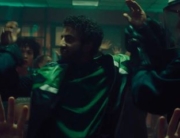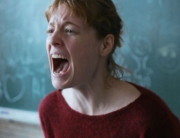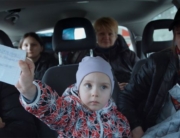Vergangenheitsbewältigung: to come to terms with the past, as postwar Germany has consistently done regarding the Third Reich. True, right? Since the Nuremberg Trials, the country has cultivated an image of a contrite nation that accepted with alacrity its responsibility for genocide and that has conscientiously required historical education so future generations would learn from the past. Wrong. Labyrinth of Lies soberly depicts how this lesson had to be reinforced by a new generation by bringing their fathers to account.
In the opening scenes set in 1958 Frankfurt, an apparently mild-mannered school teacher, Alois Schulz (Hartmut Volle), startles a passerby on the street, the elderly artist Simon Kirsch (Johannes Krisch). Kirsch recognizes him as his former Auschwitz guard, and he passes his discovery on to crusading journalist Thomas Gnielka (André Szymanski). The reporter creates a clamor in the prosecutors’ office for follow-up, but only an eager young attorney, Johann Radmann (Alexander Fehling), is willing to doggedly research the truth. He will rely on archives held by the U.S. government, camp personnel records taken by the artist at liberation, and telephone books that provide addresses of those hiding in plain sight. All along, ex-Nazis have quietly reintegrated into society, protected by bureaucrats, loyalists, and family.
Radmann is an idealistic composite figure of three staff lawyers. German-raised Giulio Ricciarelli’s feature debut looks to appeal to a new generation by emphasizing the role of consciousness-raised youth in this fictionalization of delayed justice. The events were earlier reconstructed in the 1993 German television documentary Verdict on Auschwitz: The Frankfurt Auschwitz Trial 1963-1965 that reminded the country of this forgotten challenge to the national amnesia (and outright cover-ups). A romance and what-did-you-do-in-the-war-father confrontations are thrown in to make the earnest Radmann conventionally rounded.
The documentary, and historical accounts, focus on the prosecutorial leadership of Hessian State Attorney General (and former political prisoner) Fritz Bauer, played here with grounding gravity by the eminent Gert Voss, in his last role before his death last year. Though seen only as Radmann’s ultimately supportive, if oddly distant, boss, Bauer is so revered a figure that the local and federal government funded and named in his honor a research institute on Nazi crimes, which consulted on the script. (U.S. distribution of Lars Kraume’s thriller version The People vs. Fritz Bauer is anticipated next year, following release in other countries.)
Radmann, and the film, spend too much time on screen tracking, and just missing, well-known Nazis, such as Dr. Josef Mengele. It’s implied in passing that it’s Bauer’s frustration with these misses that led him to hand over files to help the Israelis find Adolf Eichmann, whose capture plays out in the background. Quickly speeding by are montages of the time and paperwork by the overwhelmed staff to charge, arrest, and prepare for the trial of 19 Third Reich SS officers for the murder of thousands at one specific death camp that was out of sight and memory of Germans until these trials, Auschwitz in Poland.
Too bad for the audience, because it’s the very postwar ordinariness of these briefly seen burghers that’s fascinating and that stuns and spurs the staff as they take witness statements from hundreds of camp survivors. While the English title goes for alliteration of commission, the original German, Im Labyrinth des Schweigens (In the Labyrinth of the Silent), refers to the omission of keeping quiet. On the 50th anniversary of the landmark verdict, Germany selected this film for this year’s Academy Award for best foreign language film.







Leave A Comment